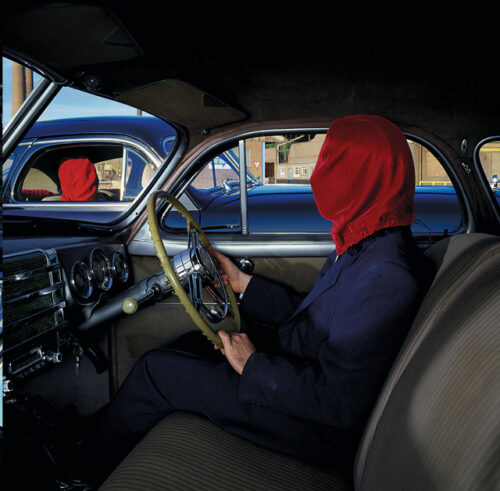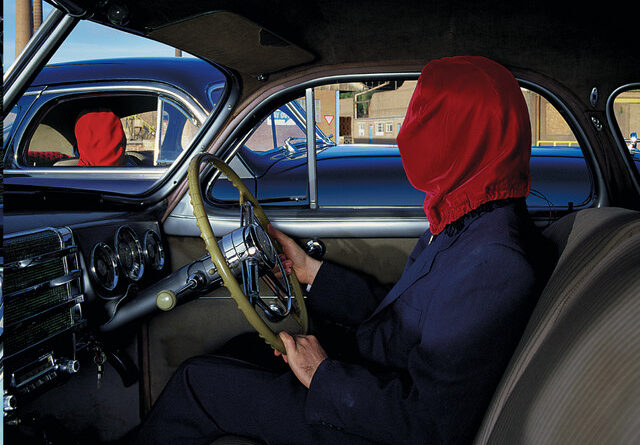HEAVY MUSIC HISTORY: Frances The Mute – The Mars Volta
The story goes that the late Jeremy Ward, cousin of AT THE DRIVE-IN‘s Jim Ward, found an anonymous journal in a car when working as a repo man. The author told of a search for their biological parents, having learned late in life that they were adopted. Omar Rodríguez-López and Cedric Bixler-Zavala adopted the story as the inspiration for THE MARS VOLTA‘s second album, Frances The Mute (2005) – a sordid tale of cultist indoctrination and escape, mass birth rituals, failed abortions and murder.
The true origins are more prosaic. In the recent documentary on the brothers and band leaders Omar and Cedric: If This Ever Gets Weird, Rodriguez-Lopez confirms the concept came from a self-authored film script, with Bixler-Zavala inventing the abandoned journal conceit. That penchant for a wild origin story (reprised with a bizarre talking Ouija board cursing their fourth album, The Bedlam In Goliath (2008)) is just one aspect of the inherent theatrical maximalism of THE MARS VOLTA and this album. Though the tall tale is perhaps a poignant tribute to Ward, who died of a heroin overdose in 2003.
By this point, THE MARS VOLTA was well-established in its own right, formed from the ashes of post-hardcore legends AT THE DRIVE-IN and their most kinetic members, Rodríguez-López and Bixler-Zavala. The pair held an outsider mentality, borne of their humble backgrounds in El Paso, Texas and reinforced in their respective Puerto Rican and Mexican heritage in a predominantly white music scene. This new project was more experimental. Their debut album, De-Loused In The Comatorium (2003), preserved some of AT THE DRIVE-IN‘s blistering, angular energy but with a progressive and psychedelic bent.
The death of Ward led to Rodríguez-López and Bixler-Zavala getting sober ahead of their second album. The fluid line-up solidified with Juan Alderete of RACER X on bass and Omar‘s brother Marcel joining on percussion. Gone, too, were the services of Rick Rubin and the use of his mansion. Rodríguez-López took on full production and writing duties, with the album recorded in various studios across California, New York, Puerto Rico and Australia.
This labour resulted in a 76-minute concept album: five tracks of intense progressive rock, the band’s most grand and experimental statement to date. THE MARS VOLTA‘s brand of progressive rock owes much to RUSH in its multi-layered embrace of virtuosity, world-building and tangible hooks. It is far from a straight clone, however. A vast Latin influence grants the band their unique voice, with more than a trace of the jazz fusion wildness of MILES DAVIS and even some ENNIO MORRICONE detectable. There are also stretches of ambient psychedelia, with extensive use of field recordings. The first four minutes of Miranda That Ghost Just Isn’t Holy Anymore feature the Coquí frogs of Puerto Rico.
Though critical opinions diverged at the time – running the gamut of perfect scores, three- and four-star reviews and a poorly-aged drubbing from Pitchfork – there was an overwhelmingly positive consensus on the musicians’ performances. Rodríguez-López‘s guitar on opener Cygnus… Vismund Cygnus and Cassandra Gemini sets a blistering, chaotic tone. The indulgent solos of The Widow and on L’Via L’Viaquez (the latter from RED HOT CHILI PEPPERS’ John Frusciante) provide guitar hero shredding fodder. Matching this is the energy of Jon Theodore‘s drumming, transmuting the cascading time signatures into propulsive syncopations that never fail to thrill. The Latin stomp of L’Via L’Viaquez is majestic in its wholesale transformation of the song’s energy from thumping rock to hip-swinging groove.
Bixler-Zavala‘s voice is a force of nature on this record – at times a belting presence that draws comparisons to Robert Plant; at others menacing, yelping, sinister. Much of the lyrics are in Spanish, including parts of the second single L’Via L’Viaquez and Cygnus… The picture built from the verbal fragments is chaotic, enigmatic and occasionally vicious. “She was a mink handjob in sarcophagus heels” never fails to shock on Cassandra Gemini. Much of the lyrics of Miranda… are graphically unsettling. The album paints the picture of a sexually exploitative cult leader and his victims through visceral metaphors of worms and body horror.
Amidst all the extensive track runtimes are two notable extremes. The Widow wastes no time establishing its “accessible single” credentials, hitting its chorus in just over 30 seconds. The historical post-hardcore influence of the band is shorn away in favour of making an instant classic rock song, full of high drama in Bixler-Zavala‘s voice and the sweeping organ and strings. Of course, the band tack on a few minutes of weird noise at the end, but with thought for the inevitable radio edit. Conversely, Cassandra Gemini closes the album with a 32-minute runtime that never once drags. Future band member Adrián Terrazas-González brings tenor sax and flute free jazz to its middle jam section, pointing to the future direction of the band.
The track listing proved to be contentious in a couple of ways. A sixth song, slated as the album’s title track, would have tipped the record into CD double-album territory and was omitted from the running order. The album artwork retained lyrics and section titles for the song, leaving fans curious as to this additional piece in the jigsaw puzzle. Ultimately, it came out as a standalone single. There remains no consensus on its proper sequencing on the album, though it ends with a reprise of the Sarcophagi section seen in Cygnus… and Cassandra Gemini.
Contractual weirdness meant that, despite its runtime, a five-track release would have paid out as an EP. The solution was to make a somewhat arbitrary split of Cassandra Gemini into eight sections. Bizarrely, these don’t line up with the section splits listed in the album notes. To this day, streaming services continue to mislabel the tracks, with titles misattributed to the wrong sections and to sections of other songs.
Frances The Mute marks the high point of THE MARS VOLTA‘s career. Its follow-up Amputechture (2006) may have grown in popularity in the interceding years, but this was when the band’s identity felt fully formed, escaping the long shadow of AT THE DRIVE-IN. The band would release four more albums before splitting in 2013. A reunion in 2022 delivered a pop-focused self-titled record and a new album slated for this year. As a progressive rock statement, it has few contemporaries; in a genre that at the time was dominated by neo-prog and an increasing move towards metal music, Frances The Mute feels refreshing and unique.

Frances The Mute was originally released on February 11 2005 via Universal Records.
Follow THE MARS VOLTA on Instagram.

